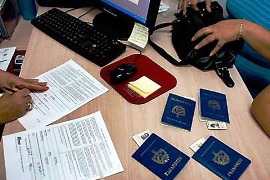Since last October when it was announced, the new legal instrument to govern the migration issues was welcomed by citizens and migrant sectors.
The domestic public policy praised for reducing travel, from simple initial processing of the passport application, soon available in less than 200 offices nationwide.
Citizens know that as of January 14th, they can travel without special permission, which has now been eliminated, and only require carrying out a passport, a visa to enter the country to visit –when needed– and the ticket.
Another of the facilities built by the new Law on Migration is increasing periods of time abroad, from 11 months to 24 without new consular procedures.
As a further step to encourage emigrants link with their native land, soon people in that condition can visit the country for a period of 90 days, 60 more than previously allowed.
Other simplifications concern the normalization of entering the country those who emigrated illegally after 1994 migration accords.
With the upcoming legal provision to take effect, these people can come back if it has been more than 8 years after the fact.
In the same situation are health professionals and athletes who left their mission abroad, refused to return or illegally left after 1990. In that situation, they can also return if it has been more than 8 years.
With the changes introduced in migration issues as part of sovereign decisions, Cuba reaffirms its fully support for a legal, orderly and safe migration.
Thus, regulations responding to the situation of those years have gone and now authorities have introduced relevant changes because the country changes and updates its economic model.
Yet, extremist sectors and conservative publications twist the new Cuban measures on migration.
The United States, where the Cuban Adjustment Act is in force since 1966, paves the way for residence of those arriving from Cuba by any route to American soil.
That country has a policy of dry feet, wet feet, to encourage illegal and insecure emigration regardless of loss of life in the adventure.
It is logical, then, that Cuba sets regulations that neutralize the negative consequences of this U.S. policy, particularly those that contribute to the preservation of skilled workers trained in the country.




